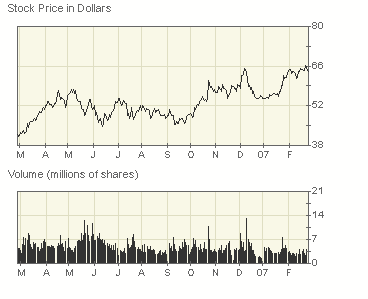Nucor Steel
I was on an online forum and the subject of Nucor Steel came up.
Looks to be a very well-run company with a very curious history.
Wikipedia has an
entry for them:
Nucor Corporation
is one of the largest steel producers in the United States, and the largest of the "mini-mill" operators (those using electric arc furnaces to melt scrap steel, as opposed to companies using traditional blast furnace technology). Nucor claims to be the largest recycler of scrap steel in the United States, recycling over 19 million tons of scrap steel annually.
What makes the company interesting is the way that it is organized:
The Nucor Culture
The Nucor Culture can be summarized in five areas: decentralized management philosophy, performance based compensation, egalitarian benefits, customer service and quality, and technological leadership. Underlying these elements is the fact that none of Nucor's plants, whether built from scratch or acquired, are unionized. Nucor is opposed to unions, believing them to be a destructive force in the US steel industry. No Nucor plant has ever held a successful union certification election, even though Nucor management has not engaged in the controversial "union busting" tactics adopted by other companies.
Decentralized Management Philosophy
Nucor is highly decentralized in its operations; there are only five employee levels at Nucor (supervisor/professional, department manager, division general manager, executive vice president, and president). Most operating decisions are made at the division level or lower. In addition, as stated above only 65 employees work at the Nucor corporate office, which may possibly be the smallest number of corporate office employees among major corporations.
And of course, the higher-ups are getting fat-cat salaries and screwing workers:
Egalitarian Benefits
Nucor's senior officers are not provided traditional "perks" such as company cars, executive parking spaces, or executive dining rooms. In fact, several programs (such as Nucor's Profit Sharing, Scholarship Program, Employee Stock Purchase Plan, Extraordinary Bonus, and Service Awards Program) are not available to Nucor's officers but only to lower-level employees. As a symbol of Nucor's egalitarian culture, the annual report has the names of every employee printed on the cover. In August of 2006, the company did purchase a corporate jet for use by senior management. In a letter to all employees from the CEO, Dan DiMicco explained that the frequent rentals of charter jets made a corporate jet purchase a cost-effective measure.
So their stock must be tanking - right?

And the history is great:
Nucor's history consists of three distinct areas: the Reo Motor Car era, the Nuclear Corporation of America era, and the current Nucor era.
The REO era
Nucor's origins are with auto manufacturer Ransom E. Olds, who founded Olds Motor Vehicle Company (later, as Oldsmobile, to become a part of General Motors) and then Reo Motor Cars, the predecessor to Nucor, in Lansing, Michigan. Though Olds' cars were popular, they were not profitable, and the company's truck business (featuring the famous Reo Speed-Wagon) was not sufficiently profitable to avoid a trip to bankruptcy court in 1938.
Reo exited the car business, concentrated on trucks (with little success), attempted to diversify into lawn mowers (which didn't help), and finally in December 1954 sold off its entire manufacturing operations (suffering a $3 million loss on the sale).
The Nuclear Corporation Era
After the sale, Reo ended up with $16 million in cash and no businesses. So it attempted to liquidate itself out of business.
However, a group of dissident shareholders noticed the tax loss and successfully challenged the liquidation in a proxy fight in September 1955. In what amounted to a "reverse hostile takeover", Reo was forced to take over a tiny corporation called Nuclear Consultants, Inc.
Eventually Reo emerged as "Nuclear Corporation of America", and relocated to the Empire State Building in New York City. However, Nuclear's attempts to emerge as a nuclear based company were no more successful than Olds was in making money on his cars and trucks. Thus, it then attempted to become a conglomerate, and once again moved its headquarters, this time to Phoenix, Arizona.
Among the many businesses purchased during Nuclear's attempts at becoming profitable was Vulcraft, a steel joist manufacturer located in Florence, South Carolina. Vulcraft was founded by Sanborn Chase (no relation to the coffee company), who died at an early age, leaving the company to his widow. Nuclear purchased Vulcraft from Chase's widow in 1962 and hired F. Kenneth Iverson as general manager.
However, Nuclear the conglomerate was no better than Nuclear the nuclear company or REO the truck manufacturer, and in March 1965 filed for bankruptcy. The Board of Directors fired Nuclear's President (and, in the process, had to return his private jet to him), but for two months could not find a replacement, as nobody wanted to head a corporation that was most likely going to go out of business. Finally, Samuel Siegel, an accountant with Nuclear (and friend of Iverson) who had actively been looking to leave the company, informed the Board of Directors he would remain with the company under two conditions: Iverson would become President and he (Siegel) would become Chief Financial Officer, conditions the Board quickly accepted.
Sounds like a great place to work for. I get a lot of their steel as they have a plant in Seattle that my local metal yard buys from. Kinda cool to realize that there is so much history to the company.
Posted by DaveH at February 27, 2007 9:07 PM
